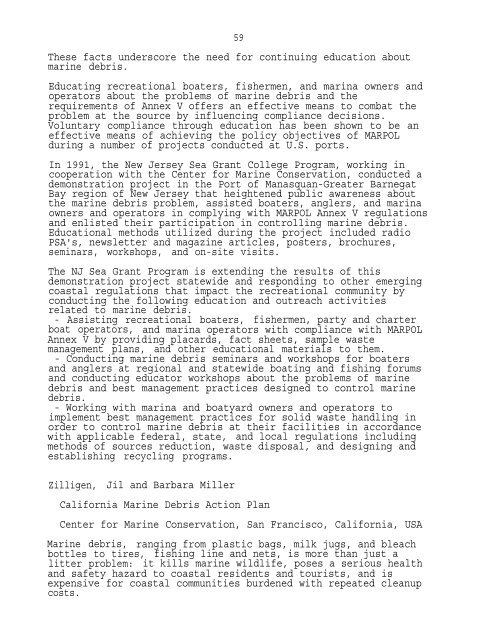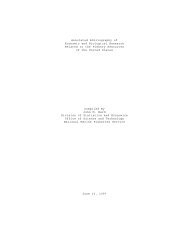Poster abstracts and manuscripts from the Third International ...
Poster abstracts and manuscripts from the Third International ...
Poster abstracts and manuscripts from the Third International ...
Create successful ePaper yourself
Turn your PDF publications into a flip-book with our unique Google optimized e-Paper software.
These facts underscore <strong>the</strong> need for continuing education about<br />
marine debris.<br />
59<br />
Educating recreational boaters, fishermen, <strong>and</strong> marina owners <strong>and</strong><br />
operators about <strong>the</strong> problems of marine debris <strong>and</strong> <strong>the</strong><br />
requirements of Annex V offers an effective means to combat <strong>the</strong><br />
problem at <strong>the</strong> source by influencing compliance decisions.<br />
Voluntary compliance through education has been shown to be an<br />
effective means of achieving <strong>the</strong> policy objectives of MARPOL<br />
during a number of projects conducted at U.S. ports.<br />
In 1991, <strong>the</strong> New Jersey Sea Grant College Program, working in<br />
cooperation with <strong>the</strong> Center for Marine Conservation, conducted a<br />
demonstration project in <strong>the</strong> Port of Manasquan-Greater Barnegat<br />
Bay region of New Jersey that heightened public awareness about<br />
<strong>the</strong> marine debris problem, assisted boaters, anglers, <strong>and</strong> marina<br />
owners <strong>and</strong> operators in complying with MARPOL Annex V regulations<br />
<strong>and</strong> enlisted <strong>the</strong>ir participation in controlling marine debris.<br />
Educational methods utilized during <strong>the</strong> project included radio<br />
PSA's, newsletter <strong>and</strong> magazine articles, posters, brochures,<br />
seminars, workshops, <strong>and</strong> on-site visits.<br />
The NJ Sea Grant Program is extending <strong>the</strong> results of this<br />
demonstration project statewide <strong>and</strong> responding to o<strong>the</strong>r emerging<br />
coastal regulations that impact <strong>the</strong> recreational community by<br />
conducting <strong>the</strong> following education <strong>and</strong> outreach activities<br />
related to marine debris.<br />
- Assisting recreational boaters, fishermen, party <strong>and</strong> charter<br />
boat operators, <strong>and</strong> marina operators with compliance with MARPOL<br />
Annex V by providing placards, fact sheets, sample waste<br />
management plans, <strong>and</strong> o<strong>the</strong>r educational materials to <strong>the</strong>m.<br />
- Conducting marine debris seminars <strong>and</strong> workshops for boaters<br />
<strong>and</strong> anglers at regional <strong>and</strong> statewide boating <strong>and</strong> fishing forums<br />
<strong>and</strong> conducting educator workshops about <strong>the</strong> problems of marine<br />
debris <strong>and</strong> best management practices designed to control marine<br />
debris.<br />
- Working with marina <strong>and</strong> boatyard owners <strong>and</strong> operators to<br />
implement best management practices for solid waste h<strong>and</strong>ling in<br />
order to control marine debris at <strong>the</strong>ir facilities in accordance<br />
with applicable federal, state, <strong>and</strong> local regulations including<br />
methods of sources reduction, waste disposal, <strong>and</strong> designing <strong>and</strong><br />
establishing recycling programs.<br />
Zilligen, Jil <strong>and</strong> Barbara Miller<br />
California Marine Debris Action Plan<br />
Center for Marine Conservation, San Francisco, California, USA<br />
Marine debris, ranging <strong>from</strong> plastic bags, milk jugs, <strong>and</strong> bleach<br />
bottles to tires, fishing line <strong>and</strong> nets, is more than just a<br />
litter problem: it kills marine wildlife, poses a serious health<br />
<strong>and</strong> safety hazard to coastal residents <strong>and</strong> tourists, <strong>and</strong> is<br />
expensive for coastal communities burdened with repeated cleanup<br />
costs.
















